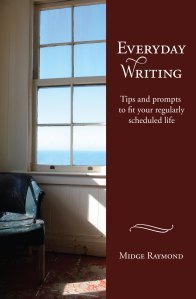Guest Post: Author Midge Raymond Talks About Being An Everyday Writer
 Talk about good timing! Today author Midge Raymond talks about being an everyday writer, and it’s just one week into Nanowrimo (National Novel Writing Month)! If you’re not familiar, from November 1 to November 30 bazillions of writers (I counted) will crank out 50,000 words. I bet each of them is writing every day!
Talk about good timing! Today author Midge Raymond talks about being an everyday writer, and it’s just one week into Nanowrimo (National Novel Writing Month)! If you’re not familiar, from November 1 to November 30 bazillions of writers (I counted) will crank out 50,000 words. I bet each of them is writing every day!
I’m not “nano-ing” this year, I’m revising a draft of my new novel. But I still want to do that every day. I think my favorite advice below is #5. Probably because I often forget to do it and realize how important it is. Tell us your favorite bit of advice in the comments below!
And please welcome Midge Raymond to Women’s Fiction Writers!
Amy xo
How to Be an Everyday Writer
 I remember the moment I got the idea for my book Everyday Writing, i.e., the moment I knew I needed a bit of an intervention as a writer. It was a few years ago, when I arrived early to meet a friend for happy hour at Seattle’s Pike Place Market. As I waited, I pulled out my phone — just to check email. Then to check Facebook. Then to play a couple rounds of Words with Friends. Then to text my husband.
I remember the moment I got the idea for my book Everyday Writing, i.e., the moment I knew I needed a bit of an intervention as a writer. It was a few years ago, when I arrived early to meet a friend for happy hour at Seattle’s Pike Place Market. As I waited, I pulled out my phone — just to check email. Then to check Facebook. Then to play a couple rounds of Words with Friends. Then to text my husband.
What I realized later, as I chatted with my friend, was how much I’d missed out on by having my nose buried in my phone. There was a couple waiting next to me who were exchanging irritable whispers in that way couples do so it won’t seem as if they’re actually arguing in public. There was a group of tourists celebrating someone’s birthday. While normally I’d have been eavesdropping and otherwise taking mental notes, I pretty much ignored it all. And I probably missed out on some great possibilities for my fiction.
As a journalist by training, it’s always been second nature for me to watch and listen — and this naturally carried over as I began writing fiction. More often than not, thanks to being curious (and, yes, a little nosy), I ended up with great story ideas or, at the very least, great snippets of dialogue. And yet, I realized that evening in Seattle, I was beginning to lose my connection to the world around me. And as writers, when we don’t pay close attention to what’s going on around us, we lose our connection to our creative selves. And while looking inward is vital for writers, so too is looking outward.
So I began to wonder how much “writing time” I was losing by looking to my cell phone instead of looking at what’s happening around me. What if I were to take these idle moments of every day — waiting for friends, standing in line — and devote them to writing?
And so I began to do just that … and I discovered that I could vastly increase the amount of writing time I had every day, even if I wasn’t sitting at my desk. And I also realized that there are probably many writers out there who might benefit from these tips and tools — and so Everyday Writing was born.
Here are a few tips to help you be an everyday writer …
Look. The more you observe in the world around you, the more material you’ll find, whether a detail for a character description or a storyline for a new novel. So pay attention, especially during the moments in which you’re usually bored (in line at the post office, for example, or waiting for your turn at the DMV) — and you’ll see that there’s a lot out there for your writer self to enjoy.
Listen. While you once may have been told it’s not polite to eavesdrop, if you’re a writer, all bets are off: Listen to everything. The nice thing about listening is that you can do it anywhere: in line at the grocery store, in the crowd of students while you’re waiting to pick up your own kid, and so on. You may also find that once you begin to listen more closely, your own conversations become deeper, more layered, and more interesting. The point, of course, is not to steal from others’ conversations but to let these overheard snippets spark your own creativity.
Develop writerly habits. Figure out where you do have a little extra time in your schedule. Can you skimp on a few household duties and still keep the place running? Probably. Can you give up an episode of Downton Abbey for some writing time instead? Maybe (well, maybe not). Can you trade an hour on Facebook for an hour of writing? Definitely. It’s amazing how much time we waste without even realizing it; figure out where your “lost time” is going and reclaim it for creative work.
Get in — and stay in — this writerly frame of mind. When you’re at the gym or out for a run, instead of listening to music, think about your characters; write the next scene in your head. If you’re stuck in traffic, turn off the radio and plot out the next chapter of your novel. These small moments of downtime and idle time can really add up — and if you fill them with thoughts about your writing projects, you’ll see your projects moving forward more briskly than you’d expect.
Always (always!) carry a notebook. Witnessing a fascinating moment does a writer no good if she forgets it later (which I invariably do if I don’t write things down). I carry a little notebook everywhere; you can also use a smartphone, and voice recorders are excellent for those who are in the driver’s seat a lot. Get in the habit of good note-taking so you won’t lose all the little treasures you pick up in your regularly scheduled life.
Most of all, remember that being a writer isn’t about sitting somewhere and typing. It’s about observing, listening, thinking, empathizing, dreaming, and so much more — these are the things that turn typing into writing.
 Midge Raymond is the author of the story collection Forgetting English, which received the Spokane Prize for Short Fiction. Originally published by Eastern Washington University Press in 2009, an expanded edition was published by Press 53 in 2011. She is also the author of Everyday Writing: Tips and Prompts to Fit Your Regularly Scheduled Life, and the companion title Everyday Book Marketing. Her award-winning stories have appeared in TriQuarterly, Bellevue Literary Review, the Los Angeles Times, and many other publications.
Midge Raymond is the author of the story collection Forgetting English, which received the Spokane Prize for Short Fiction. Originally published by Eastern Washington University Press in 2009, an expanded edition was published by Press 53 in 2011. She is also the author of Everyday Writing: Tips and Prompts to Fit Your Regularly Scheduled Life, and the companion title Everyday Book Marketing. Her award-winning stories have appeared in TriQuarterly, Bellevue Literary Review, the Los Angeles Times, and many other publications.


Women's Fiction Writers
- Amy Sue Nathan's profile
- 543 followers



